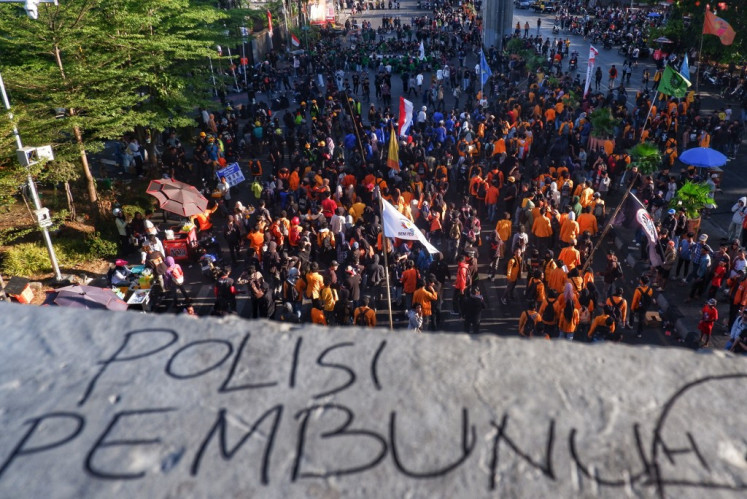Popular Reads
Top Results
Can't find what you're looking for?
View all search resultsPopular Reads
Top Results
Can't find what you're looking for?
View all search resultsIndonesia takes on bumpy road to ending death penalty
Indonesia needs principles-based politics and a new generation of leaders consciously and boldly stepping up against the death penalty.
Change text size
Gift Premium Articles
to Anyone
H
ow can one of the least politically appealing issues in Indonesia turn into a central piece of the national debate linked to the elections set for 2024?
How can we convince political parties and presidential aspirants to pick an issue that normally is easier and more convenient to neglect and forget rather than debate?
And finally, what it is going to take for this issue to be framed within a broader framework of human rights?
I am talking about the death penalty, one of the most difficult topics to be discussed in Indonesia. The ongoing amendment of the Criminal Code could offer some hope and tangible venues for the country to move toward a criminal justice system that rejects capital punishment.
While what looks like a very technical and legalistic debate on how capital punishment might soon be “constrained” to becoming a last resort, it should instead spark a debate that must involve and engage all the political classes and the citizenry, especially the new generations.
As inconvenient as it is, this is a case for Indonesian political leadership to step up and initiate an open-minded dialogue that can move the country well beyond the technicalities of a more progressive penal code.
After all, the recent fourth cycle of the Universal Periodic Review undertaken by Indonesia at the Human Rights Council offers a grim picture of the overall human rights situation in the country. Despite the government’s claim about its steadfast commitment to human rights, the milestones it has reached are not nearly close to what we should expect from a rising power like Indonesia.
As a country that just recently successfully hosted the Group of 20 Summit, despite the difficult presidency, and as a nation that aspires to become fully developed and a leader in energy transition, Indonesia should have raised its bar on human rights standards higher. Indonesian needs a broader human rights conversation that ranges from freedoms for sexual minorities to abuses in Papua.
For me, capital punishment is the peak of a large pyramid of practices that are not yet fully aligned with the most advanced and progressive values of this century, values that certainly do not belong solely to the West.
Instead, such values should be intrinsic to each and every legal framework of all nations around the world, including those not embracing liberal democracy.
To better understand its intricacies, I discussed with Yosua Octavian Simatupang, a caseworker coordinator at the Legal Aid Institute for Society (LBHM), one of the most prominent human rights groups in Indonesia, the prospect of having the question of the death penalty included in the upcoming electoral cycle in 2024.
Unsurprisingly Octavian was not particularly hopeful about any future candidates consciously picking the death penalty as an issue to campaign against. After all, the self-interested logic goes, why should they bother when there are many other key issues to be raised to woo voters?
Of course, it is an issue of principles and values but more often than not such moral questions are simply unseen. Yet according to Octavian, there are also reasons for optimism.
First of all, the work that LBHM has been doing for many years behind the scenes is paying some dividends. Since its foundation in 2007, LBHM has received 46 people who were threatened with the death penalty, 19 were women.
Asked if he believed there were some politicians who, in principle, opposed capital punishment, he said it was hard to say, because ultimately it can be “expensive” and damaging in terms of political capital to openly advocate and campaign for the abolition of the death penalty.
Yet there are some that are openly and unequivocally against it. For example, NasDem Party lawmaker Taufik Basari and Muslim-based United Development Party politician Arsul Sani.
The two could truly become champions of the anti-capital punishment movement, although it remains too small to have a real impact at the national level. They need a boost from the highest levels of political leadership, otherwise they would end up like two Don Quixotes.
Religion can be a big obstacle to the quest for ending the death penalty, as recently elucidated in this paper by Amira Paripurna.
Any technical implications of having the death penalty as a special punishment as per the new draft of the new Criminal Code can undoubtedly be regarded as a step forward to better tackle and oppose international drug syndicates.
What is needed, though, is political will.
Let’s not forget that the National Human Rights Commission of Indonesia (Komnas HAM) in its submission for the fourth UPR strongly “recommended that the government abolish the death penalty in every statutory regulation; stop pursuing the death penalty in prosecution; conduct case by case examination of all death penalty decisions at the Supreme Court and implement death penalty commutation for convicts on death row”.
It is impossible to get a louder and clearer message than this from a constitutional body, an organ mandated to be the guardian of human rights.
Last but not the least, the new draft Criminal Code is not tantamount to an overall and unequivocal improvement in matters of human rights, as explained by the United Nations country team for the same review. “We express concern about procedural and substantive aspects underlying long-delayed legislative and legal reforms, in particular, deliberations on draft revisions to the Criminal Code”.
This is the reason why, as Octavian shared, we should not just expect miracles out of this new draft.
There is a need to create support groups and community activism that can convince politicians to take the risk to join this conversation. Indonesia needs principles-based politics and a new generation of leaders consciously and boldly stepping up.
President Joko “Jokowi” Widodo has not only the moral authority to ensure that the new criminal code becomes the most progressive legislation in the world and pave the way for politicians and citizens to be free to openly discuss ways to abolish the death penalty. He also needs to reject the politics of convenience and strive to understand that human rights, including a full abolishment of the death penalty, do matter and make the difference in lifting Indonesia among the most advanced nations.
These are nations that are able to project their power not because of their abuses or lack of citizens’ protections but because of their steadfast principled and values based governing.
One way to start would be for President Joko “Jokowi’ Widodo to initiate a serious, open and inclusive review of the implementation of the National Action Plan on Human Rights.
***
The writer is a cofounder of ENGAGE, who comments on social inclusion, youth development, regional integration, SDGs and human rights in the Asia-Pacific context.










